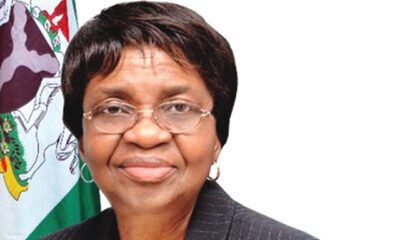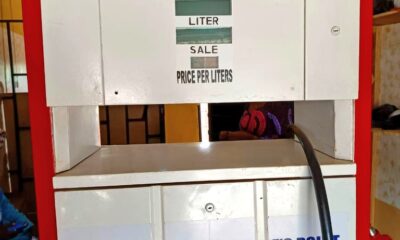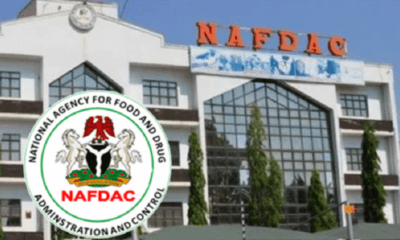Health
Drug export: Agents pledge to support NAFDAC through unified exportation procedure
In its quest to finding lasting solutions to the problem of Nigeria non-oil export rejects abroad, the National Agency for Food and Drug Administration and Control (NAFDAC) has once again extended hands of collaboration to critical stakeholders in the nation’s ports with a view to working together to revamp the export trade in the non-oil sector and reduce the rejection of Nigerian products thereby positioning the country in a better state in the Global market.
The Director General, NAFDAC, Prof Mojisola Adeyeye who was ably represented by Dr Abimbola Adegboye, the Director, Port Inspection Directorate (PID), who also heads the Office of Trade and International Relations (OTIR), at a consultative meeting with Pre-shipment Inspection Agents on Friday, expressed the Agency’s discomfort with the alarming rate of rejections of food exports from Nigeria.
She pointed out that the meeting was aimed at building effective collaboration with NAFDAC to complement its robust regulatory policies geared toward understanding the NAFDAC export processes, collaboration to safeguard a unified exportation procedure and zero rejects of Nigeria export products.
She expressed dismay that a competent authority on food safety matter with all her acclaimed global accreditation in food safety testing could be totally blanked out in the listed requirements for issuance of Clean Certificate of Inspection (CCI) by the Pre-shipment Inspection Agents. No wonder there are high volumes of reject from Nigeria as the NAFDAC regulated products were not tested nor production processes validated for compliance before export.
Present at the meeting were the top management staff of Neroli Technologies Limited, the agent covering South-south and South-west zone; Anglia International Services Limited, the agent covering North-West and North-Central zone and Gojopal Nigeria Limited, the PIA covering North-East and South-East zone. They all made commitments to immediate rectification of this lapse on their website and their process and enlightening their client to use the Nigeria Single Window for Trade portal (www.swt.gov.ng)to procure their exports certification.
NAFDAC as a Governmental Agency was established by Enabling Act Cap N1 Laws of the Federation of Nigeria (LFN) 2004 which empowers the Agency as the competent authority in Nigeria and charged with the responsibility of regulating and controlling the quality of manufactured, importation, exportation, distribution, advertisement, sale, and consumption of food, drug, chemicals, and other regulated products. Essentially, the NAFDAC mandate is to ensure traded products are of good quality, safe and wholesome.
The Port Inspection Directorate of the Agency has met with the Chairman of Comprehensive Import Supervision Scheme (CISS) and Nigeria Export Supervision Scheme NESS, Area Comptroller of Nigeria Customs Services at the Ports, advocacy visits were made to export sheds at seaports, airports, and land boarders.
She however, expressed her appreciation of the activities of PIAs as a main actor in the processes chain of exportation adding that coming together of the critical stakeholders will help make the trade of non-oil sector to be better, more robust and more consultative.
“NAFDACs door is opened to enhance export and trade, we encourage and support trade of quality products,” she said, adding that “we are enjoining the PIAs to be part of the game and to make sure we collaborate effectively.”
The NAFDAC boss noted that the Agency acknowledges the importance of having broader and deeper Interactions and collaborations with sister agencies such as Standards Organization of Nigeria (SON), Nigeria Agricultural Quarantine Service (NAQS), Nigeria Export Promotion Council (NEPC), Nigeria Custom Service (NCS) etc.
Prof Adeyeye emphasised the position of export as a major aspect of building every country’s economy because of its importance in international trade and economic stability, therefore the reason for regulation of the sector is to ensure that products that leave a country’s shores are of good quality, safe and meet international best practices among others.
For Nigeria, she said trade is critical to the national economic makeup, adding that in 2021, Nigeria exported $57.7 billion of goods, making it the world’s 52nd most exporting country.
Prof. Adeyeye disclosed that Cocoa beans, sesame seeds, cashew and seven other products top the list of agricultural commodities Nigeria exported within the first nine (9) months of 2022, generating N427.6 billion or $1.02billion.
The DG reiterated that huge volume of Nigeria’s exported agricultural commodities were often rejected by the European Union for not meeting required standards, adding that EU countries seized about 82 per cent of Nigeria’s agricultural products exported illegally.
According to her, these products are non-documented items and people move them out without clearance by the relevant regulatory agency.
The DG NAFDAC listed the following as reasons for export rejects: Technical Barrier issues e.g., defective packaging and inadequate labelling. Non-Documentation, Unauthorised transition, Illegal importation, Non-compliance to destination markets’ standards, the EU will reject consignments containing food that do not comply with EU maximum residue limits (MRLs) for Vet Medicine and Pesticides, and maximum limits (MLs) for Contaminants in foods.
Others include exporters’ boycott of relevant regulatory Agency e.g., NAFDAC, in the process of exportation, which leads to rejects, private huge losses and absence of government-to-government communications.
Prof. Adeyeye however maintained that tightening the regulatory and inspection regime for exports of food items and agricultural products is one of the ways to address export rejections, adding that all relevant Government Agencies and associations involved in Nigerian exports should ensure agro products exported are safe, of good quality and meet the specified International Standards.
“When all other relevant efforts are merged, we can achieve the reduction of reject on Nigerian export food commodities and increase foreign exchange earnings,” she said.
Health
Outbreak: Zamfara Govt. confirms 4 deaths, 177 cases


The Zamfara Commissioner for Health, Dr Aisha Anka has confirmed the outbreak of unknown illness in the state which recorded four deaths and 177 cases so far.
Anka confirmed this in a statement issued in Gusau on Friday by the Information Officer of the ministry, Malam Bello Ibrahim.
According to the commissioner, the disease is characterized by abdominal distension, accumulation of fluid in the abdomen, enlarge liver, enlarge spleen, fever and general body weakness.
“The illness is found in Maradun, Shinkafi and Gusau local government areas in the state.
“Children are mostly affected and the cases are associated with water consumptions.
“So far, four deaths have been recorded, 177 cases were detected,” Anka said.
“The incident has been reported to the National Centre for Disease Control (NCDC), partners and all other relevant stakeholders.
“The ministry of health is currently on the emergency response phase to identify the illnesses and causes.
“Various biological human and animal samples, soil samples, water samples, agricultural and foodstuff samples have been taken to Lagos and Abuja laboratories for analysis.
“The ministry will continue to update the general public and all relevant stakeholders and partners on any update about the outbreak,”she added. (
Health
Assembly passes Kano Pre-Marital Health Screening Bill


Kano State House of Assembly has passed a bill for a law to compel intending couples to undergo HIV, hepatitis and sickle cell anaemia screening before marriage.
The passage followed deliberations in the Committee of the Whole House during plenary session,
presided over by the Speaker, Ismail Falgore on Monday in Kano.
After deliberations, the lawmakers approved the 3rd reading of the bill, read by the Deputy Clerk, Alhaji Nasiru Magaji.
Shortly after passage of the bill, the Majority Leader of the house, Lawan Hussein (NNPP-Dala), stated that “any person
intending to marry shall first submit self for medical examinations.”
He said the bill was considered and passed after the 3rd reading, following various legislative processes.
The leader further said that the bill was passed because the state had been battling with different health issues, including
HIV because people go into marriages without medical screening.
He said that the bill, if signed into law, would save many lives and curb the spread of life-threatening diseases.
“The bill will safeguard the health of citizens by institutionalising pre-marital testing to check the spread of diseases
like hepatitis, HIV and sickle cell anaemia,” he added.
Health
WHO to begin vaccination against Human Papilloma Virus May 27 in Kogi


The World Health Organisation (WHO), says it plans to commence vaccination against Human Papilloma Virus (HPV) on May 27 in Kogi.
The state’s Team Lead of WHO, Dr Muktar Toyosi, said this when he led his team on an advocacy visit to the State Council of the Nigeria Union of Journalists (NUJ) on Wednesday in Lokoja.
Toyosi said that the vaccination was meant for girl child of between the age nine and 14.
He said the ongoing sensitisation was to keep the people informed, and educate them on the vaccination of their children to protect them against cervical cancer in future.
”Kogi falls within the second phase of the programme. We are soliciting for the cooperation of the media in educating the people of the state on the HPV vaccination.
“There need for girls child across the state to take the vaccination to safeguard their future.
“Although the vaccine was initially scarce and difficult to get, the good news now is that it has been made available by the government,” Toyosi said.
Also speaking, the State Technical Assistant for WHO, Dr Ahmed Attah, said that the HPV mostly affect women, adding that the vaccination remained a preventive measure against the disease.
Attah, a former state Chairman of the Nigeria Medical Association (NMA) and a former Chief Medical Director (CMD), Kogi Specialist Hospital (KSSH) Lokoja, urged parents and guardians to avail their children of the vaccination to justify government’s investment.
In his response, the Kogi NUJ Chairman, Mr Seidu Ademu, described the health sector as very critical, stressing that the vaccination was a right step in the right direction.
Ademu promised a robust partnership with WHO to enable the team to achieve its set goals.
He stressed the need to inform, educate and sensitise the general public on the need to embrace the vaccine by ensuring that girls within the age range were vaccinated.
-
Finance4 months ago
Court orders Sen. Victor Umeh to repay N136m bank debt to AMCON
-



 Abuja Update3 months ago
Abuja Update3 months agoUNDP, FG partnership needed to achieve inclusion, equity- Minister
-
capital market2 years ago
Rt.briscoe, FBNH, Others halts negative performance of stock market
-
Abuja Update2 months ago
Banks drive stock market performance with N147bn gain
-
Submission Guidelines4 months ago
CALL FOR SUBMISSIONS: POETRY COLUMN-NND
-



 Health1 month ago
Health1 month agoCapacity training will reduce migration of health workers- NPHCDA
-



 Business4 weeks ago
Business4 weeks agoTingo Group unveils Tingo Electric, Tingo Cola drink at Lagos launch
-
News4 months ago
Oil thieves sponsoring malicious media campaign against Navy – Spokesman














